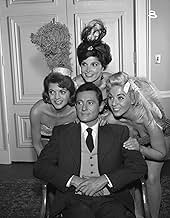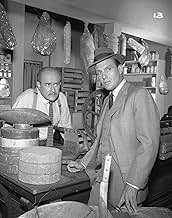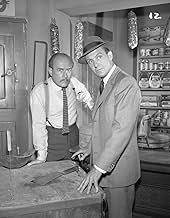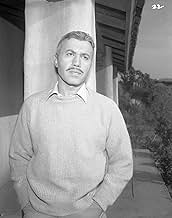CALIFICACIÓN DE IMDb
8.0/10
3.3 k
TU CALIFICACIÓN
El agente especial Eliot Ness y su equipo de élite de agentes luchan contra el crimen organizado en la década de 1930 en Chicago.El agente especial Eliot Ness y su equipo de élite de agentes luchan contra el crimen organizado en la década de 1930 en Chicago.El agente especial Eliot Ness y su equipo de élite de agentes luchan contra el crimen organizado en la década de 1930 en Chicago.
- Ganó 2 premios Primetime Emmy
- 4 premios ganados y 7 nominaciones en total
Explorar episodios
Opiniones destacadas
I must differ only slightly from the praise of one who precedes me, but yes, it was a cracking good show! When a local station ran the series in syndication at midnight in 1967, I turned into an insomniac.
Part of it was my youth; part was/is the b&w presentation giving it a brooding, "gritty" (pardon the cliche) flavour; part was the musical score. Frankly, I found it much superior to the colour and more mature (?) series recently under the same title. Possibly the early '60s series had the elements of a morality play that move some part of me that the more ambiguous -- and in places historically accurate -- new UNTOUCHABLES can not.
One thing bothers me, however, although I fully understand that in the television productions of forty years ago one had to be discrete. It concerns the depictions of violence. I do not object (within reason) to violence per se, but THE UNTOUCHABLES showed a lot of it without the horror. With a more jaundiced eye of the 1990s, when on very rare occasions I have been able to see an old time episode, I am struck by the trivialisation of violent scenes. Even the point-blank firearms shots are comically muted, and there is never a hint of flying blood.
That said, however, I consider the advent of THE UNTOUCHABLES and BONANZA in the 1959-60 season as the beginning of the REAL "golden age of television" in the United States.
Post scriptum: I am sure there were a couple of spin-off "made for TV" movies in the 1960s from the series. Of that I know nothing more save the title of one of them: THE GUN OF ZANGARA.
Part of it was my youth; part was/is the b&w presentation giving it a brooding, "gritty" (pardon the cliche) flavour; part was the musical score. Frankly, I found it much superior to the colour and more mature (?) series recently under the same title. Possibly the early '60s series had the elements of a morality play that move some part of me that the more ambiguous -- and in places historically accurate -- new UNTOUCHABLES can not.
One thing bothers me, however, although I fully understand that in the television productions of forty years ago one had to be discrete. It concerns the depictions of violence. I do not object (within reason) to violence per se, but THE UNTOUCHABLES showed a lot of it without the horror. With a more jaundiced eye of the 1990s, when on very rare occasions I have been able to see an old time episode, I am struck by the trivialisation of violent scenes. Even the point-blank firearms shots are comically muted, and there is never a hint of flying blood.
That said, however, I consider the advent of THE UNTOUCHABLES and BONANZA in the 1959-60 season as the beginning of the REAL "golden age of television" in the United States.
Post scriptum: I am sure there were a couple of spin-off "made for TV" movies in the 1960s from the series. Of that I know nothing more save the title of one of them: THE GUN OF ZANGARA.
This was a one hour crime drama show shot in spartan black and white that lasted four seasons and supposedly followed the exploits of Elliott Ness (Robert Stack) and his Untouchables (unbribable) during their time in Chicago, 1931- 1933, although the details are very fictionalized.
It managed to stay interesting and creative by centering loosely on the criminal exploits of Al Capone and mainly Frank Nitti, played by Bruce Gordon throughout the series, but branching out to other Prohibition era criminals, often without the involvement of the Capone gang, and sometimes even without much mention of the Untouchables themselves. In fact, the Untouchables are often shown dealing with issues such as local murders that would be outside the purview of federal law enforcement and more in line with what the local police would have dealt with.
The guest stars are like a who's who of 1960s TV and even film - Elizabeth Montgomery, Lee Marvin, Cliff Robertson, Victor Buono, Rip Torn, Werner Klemperer, Brian Keith, etc. - as well as some veteran film stars such as William Bendix, Barbara Stanwyck, and J. Carroll Naish.
The show is episodic, skipping around in time, and it is interesting that with all of the talk of bringing criminals to justice that Ness ends up shooting it out with and ultimately killing almost all of the criminals at the end of the show. Either that or rival criminals ended up killing each other. The Department of Justice couldn't have been happy about that.
Ness died shortly before this series began, and it is ironic that the best days of his career were during his time with the Untouchables. Afterwards his life went on a downwards trajectory and included a couple of divorces, a failed election campaign for mayor of Cleveland, and failed business ventures. His time with the Untouchables largely forgotten by his death, this TV show resurrected interest in that period of history and thus that period of Ness' life.
It managed to stay interesting and creative by centering loosely on the criminal exploits of Al Capone and mainly Frank Nitti, played by Bruce Gordon throughout the series, but branching out to other Prohibition era criminals, often without the involvement of the Capone gang, and sometimes even without much mention of the Untouchables themselves. In fact, the Untouchables are often shown dealing with issues such as local murders that would be outside the purview of federal law enforcement and more in line with what the local police would have dealt with.
The guest stars are like a who's who of 1960s TV and even film - Elizabeth Montgomery, Lee Marvin, Cliff Robertson, Victor Buono, Rip Torn, Werner Klemperer, Brian Keith, etc. - as well as some veteran film stars such as William Bendix, Barbara Stanwyck, and J. Carroll Naish.
The show is episodic, skipping around in time, and it is interesting that with all of the talk of bringing criminals to justice that Ness ends up shooting it out with and ultimately killing almost all of the criminals at the end of the show. Either that or rival criminals ended up killing each other. The Department of Justice couldn't have been happy about that.
Ness died shortly before this series began, and it is ironic that the best days of his career were during his time with the Untouchables. Afterwards his life went on a downwards trajectory and included a couple of divorces, a failed election campaign for mayor of Cleveland, and failed business ventures. His time with the Untouchables largely forgotten by his death, this TV show resurrected interest in that period of history and thus that period of Ness' life.
i became aware of the untouchables in the mid-late 1970's. when it was on, i stopped everything to watch it sometimes twice a day. didn't matter that i saw each episode a million times! the stories, the acting, the theme song was the best there is. Robert stack,Paul Picerni, Bruce Gordon, Neville Brand and especially Nick Georgiade (who is my very most favorite) all did great jobs. the show still holds up today. in fact, its better than most of whats on today! it would be great if a channel would pick it up and we could watch it again. just knowing these untouchable websites exist makes me feel really warm and good. thanks for being here for us. I've been trying to locate nick georgiade to write a fan/thank-you letter but have been unsuccessful. well, i can look at him here. i miss this show.
I had never heard of "The Untouchables" TV show until one morning
my 8th grade English teacher, Mr. Schmidt started ranting about the
graphic violence depicted in movies and on television shows such as
"The Untouchables" and what was he world coming to? From the next
broadcast, I was an avid fan. Much as in the style of the James Cagney
classic of 1933, "Public Enemy," "The Untouchables" wove a web of
mysterious gangland horror by NOT showing the graphic violence but by
instead keeping the killing in the shadows. The creators of the series
never forgot that there is nothing you can show in theater that can
measure up to the imagination of the audience. Another mysterious dimension to the series is, like "The Alfred
Hitchcock Show", "The Untouchables" had an uncanny knack of featuring
actors who would later become stars or at least very well known faces
in movies and on television. After 4 years in the air force including
a year in Vietnam, I watched the series as daily re-runs during the
summer of 1971 just before going to university in Tokyo. One episode
had Telly Savalas as an up and coming bookkeeper with The Mob run by
Frank Nitty while Al Capone was in prison. That evening other business
pulled me away from the television set and I figured I'd see the second
half of the show some other time. Because I have been in Japan ever
since, I never did find out whatever happened to the character played
by Telly Savalas. Less than two years later, however, Telly Savalas
finally made it big in television as Kojak.
my 8th grade English teacher, Mr. Schmidt started ranting about the
graphic violence depicted in movies and on television shows such as
"The Untouchables" and what was he world coming to? From the next
broadcast, I was an avid fan. Much as in the style of the James Cagney
classic of 1933, "Public Enemy," "The Untouchables" wove a web of
mysterious gangland horror by NOT showing the graphic violence but by
instead keeping the killing in the shadows. The creators of the series
never forgot that there is nothing you can show in theater that can
measure up to the imagination of the audience. Another mysterious dimension to the series is, like "The Alfred
Hitchcock Show", "The Untouchables" had an uncanny knack of featuring
actors who would later become stars or at least very well known faces
in movies and on television. After 4 years in the air force including
a year in Vietnam, I watched the series as daily re-runs during the
summer of 1971 just before going to university in Tokyo. One episode
had Telly Savalas as an up and coming bookkeeper with The Mob run by
Frank Nitty while Al Capone was in prison. That evening other business
pulled me away from the television set and I figured I'd see the second
half of the show some other time. Because I have been in Japan ever
since, I never did find out whatever happened to the character played
by Telly Savalas. Less than two years later, however, Telly Savalas
finally made it big in television as Kojak.
Quinn Martin, Desilu and Robert Stack propelled a crime series into the status of TV greatness. This series ran 114 episodes long, but stands shoulder to shoulder with such giants as GUNSMOKE and BONANZA. Set in Chicago, late 20s and 30s during depressed times and prohibition, Special Treasury Agent Elliot Ness(Robert Stack)and his band of crime fighters must deal with bootleggers, gangland murderers, assassins and crime figures like Al Capone(Neville Brand) and Frank Nitti(Bruce Gordon). Expertly narrated by Walter Winchell, this power packed crime drama got the story told without the use of on screen gore, profanity or blatant violence.
Besides the super work by Stack and Gordon others became familiar faces:Nicholas Georgiade, Oscar Beregi Jr., Anthony George, Abel Fernandez, Jerry Paris, Steve London, Grant Richards and Jason Wingreen. This series was so near perfection production wise. Awesome.
Note: TV Land, A & E, Nick at Nite, TNN...somebody put this back on the air for future generations.
Besides the super work by Stack and Gordon others became familiar faces:Nicholas Georgiade, Oscar Beregi Jr., Anthony George, Abel Fernandez, Jerry Paris, Steve London, Grant Richards and Jason Wingreen. This series was so near perfection production wise. Awesome.
Note: TV Land, A & E, Nick at Nite, TNN...somebody put this back on the air for future generations.
¿Sabías que…?
- TriviaWalter Winchell received a reported $25,000 per episode for his narration on this series. With his signature machine gun dialogue delivery, he could apparently rack up almost 200 words per minute.
- ErroresThe opening credits for the fourth season show a book open to a page that reads "The Untouchables, 1929--1933". This contradicts the chronology of several episodes set in 1934 or 1935.
- Citas
Police Officer: There is nothing in that area... except an old abandoned warehouse.
- ConexionesEdited into The Scarface Mob (1959)
Selecciones populares
Inicia sesión para calificar y agrega a la lista de videos para obtener recomendaciones personalizadas
- How many seasons does The Untouchables have?Con tecnología de Alexa
Detalles
- Fecha de lanzamiento
- País de origen
- Idioma
- También se conoce como
- The Untouchables
- Locaciones de filmación
- Productoras
- Ver más créditos de la compañía en IMDbPro
- Tiempo de ejecución50 minutos
- Color
- Mezcla de sonido
- Relación de aspecto
- 4:3
Contribuir a esta página
Sugiere una edición o agrega el contenido que falta







































